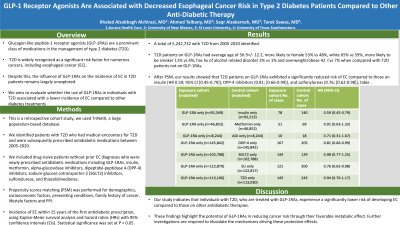Tuesday Poster Session
Category: Esophagus
P3921 - GLP-1 Receptor Agonists Are Associated With Decreased Esophageal Cancer Risk in Type 2 Diabetes Patients Compared to Other Anti-Diabetic Therapy
Tuesday, October 29, 2024
10:30 AM - 4:00 PM ET
Location: Exhibit Hall E

Has Audio

Khaled Alsabbagh Alchirazi, MD
Aurora Healthcare
Brookfield, WI
Presenting Author(s)
Khaled Alsabbagh Alchirazi, MD1, Ahmed El Telbany, MD, MPH2, Saqr Alsakarneh, MD3, Tarek Sawas, MD4
1Aurora Healthcare, Brookfield, WI; 2University of New Mexico, Albuquerque, NM; 3University of Missouri - Kansas City School of Medicine, Kansas City, MO; 4UT Southwestern, Coppell, TX
Introduction: Glucagon-like peptide-1 receptor agonists (GLP-1RAs) are a prominent class of medications in the management of type 2 diabetes (T2D). T2D is widely recognized as a significant risk factor for numerous cancers, including esophageal cancer (EC). Despite this, the influence of GLP-1RAs on the incidence of EC in T2D patients remains largely unexplored. This study aims to evaluate whether the use of GLP-1RAs in individuals with T2D associated with a lower incidence of EC compared to other diabetes treatments.
Methods: This is a retrospective cohort study using TriNetX, a large population-based database, to evaluate patients with T2D who had medical encounters for T2D and were subsequently prescribed antidiabetic medications between 2005-2020. We included drug-naive patients without prior EC diagnoses who were newly prescribed antidiabetic medications including GLP-1RAs, insulin, metformin, alpha-glucosidase inhibitors, dipeptidyl-peptidase 4 (DPP-4) inhibitors, sodium-glucose cotransporter-2 (SGLT2) inhibitors, sulfonylureas, and thiazolidinediones. The study groups were matched 1:1 using propensity scores (PSM) for demographics, socioeconomic factors, preexisting conditions, family cancer history, lifestyle factors and proton pump inhibitor. We analyzed the incidence of EC within 15 years of the first antidiabetic prescription, using Kaplan-Meier survival analysis and hazard ratios (HRs) with 95% confidence intervals (CIs). Statistical significance was set at P < .05.
Results: The study encompassed a total of 5,242,732 with T2D who were subsequently prescribed antidiabetic medications. T2D patients on GLP-1RAs had average age of 56.9+/- 12.2, more likely to be female 53% vs 48%, White 65% vs 59%, smoker 11% vs 4%, has hx of alcohol related disorder 2% vs 1% and overweight/obese 42٪ vs 7% when compared to T2D patients not on GLP-1RAs. After PSM, our results showed that T2D patients on GLP-1RAs exhibited a significantly reduced risk of EC compared to those on insulin (HR 0.59; 95% CI [0.45-0.79]), DPP-4 inhibitors (0.81; [0.66-0.99]), and sulfonylureas (0.76; [0.62-0.98]), table 1.
Discussion: Our study indicates that individuals with T2D, who are treated with GLP-1RAs, experience a significantly lower risk of developing EC compared to those on other antidiabetic therapies. These findings highlight the potential of GLP-1RAs in reducing cancer risk through their favorable metabolic effect. Further investigations are required to elucidate the mechanisms driving these protective effects.
Note: The table for this abstract can be viewed in the ePoster Gallery section of the ACG 2024 ePoster Site or in The American Journal of Gastroenterology's abstract supplement issue, both of which will be available starting October 27, 2024.
Disclosures:
Khaled Alsabbagh Alchirazi, MD1, Ahmed El Telbany, MD, MPH2, Saqr Alsakarneh, MD3, Tarek Sawas, MD4. P3921 - GLP-1 Receptor Agonists Are Associated With Decreased Esophageal Cancer Risk in Type 2 Diabetes Patients Compared to Other Anti-Diabetic Therapy, ACG 2024 Annual Scientific Meeting Abstracts. Philadelphia, PA: American College of Gastroenterology.
1Aurora Healthcare, Brookfield, WI; 2University of New Mexico, Albuquerque, NM; 3University of Missouri - Kansas City School of Medicine, Kansas City, MO; 4UT Southwestern, Coppell, TX
Introduction: Glucagon-like peptide-1 receptor agonists (GLP-1RAs) are a prominent class of medications in the management of type 2 diabetes (T2D). T2D is widely recognized as a significant risk factor for numerous cancers, including esophageal cancer (EC). Despite this, the influence of GLP-1RAs on the incidence of EC in T2D patients remains largely unexplored. This study aims to evaluate whether the use of GLP-1RAs in individuals with T2D associated with a lower incidence of EC compared to other diabetes treatments.
Methods: This is a retrospective cohort study using TriNetX, a large population-based database, to evaluate patients with T2D who had medical encounters for T2D and were subsequently prescribed antidiabetic medications between 2005-2020. We included drug-naive patients without prior EC diagnoses who were newly prescribed antidiabetic medications including GLP-1RAs, insulin, metformin, alpha-glucosidase inhibitors, dipeptidyl-peptidase 4 (DPP-4) inhibitors, sodium-glucose cotransporter-2 (SGLT2) inhibitors, sulfonylureas, and thiazolidinediones. The study groups were matched 1:1 using propensity scores (PSM) for demographics, socioeconomic factors, preexisting conditions, family cancer history, lifestyle factors and proton pump inhibitor. We analyzed the incidence of EC within 15 years of the first antidiabetic prescription, using Kaplan-Meier survival analysis and hazard ratios (HRs) with 95% confidence intervals (CIs). Statistical significance was set at P < .05.
Results: The study encompassed a total of 5,242,732 with T2D who were subsequently prescribed antidiabetic medications. T2D patients on GLP-1RAs had average age of 56.9+/- 12.2, more likely to be female 53% vs 48%, White 65% vs 59%, smoker 11% vs 4%, has hx of alcohol related disorder 2% vs 1% and overweight/obese 42٪ vs 7% when compared to T2D patients not on GLP-1RAs. After PSM, our results showed that T2D patients on GLP-1RAs exhibited a significantly reduced risk of EC compared to those on insulin (HR 0.59; 95% CI [0.45-0.79]), DPP-4 inhibitors (0.81; [0.66-0.99]), and sulfonylureas (0.76; [0.62-0.98]), table 1.
Discussion: Our study indicates that individuals with T2D, who are treated with GLP-1RAs, experience a significantly lower risk of developing EC compared to those on other antidiabetic therapies. These findings highlight the potential of GLP-1RAs in reducing cancer risk through their favorable metabolic effect. Further investigations are required to elucidate the mechanisms driving these protective effects.
Note: The table for this abstract can be viewed in the ePoster Gallery section of the ACG 2024 ePoster Site or in The American Journal of Gastroenterology's abstract supplement issue, both of which will be available starting October 27, 2024.
Disclosures:
Khaled Alsabbagh Alchirazi indicated no relevant financial relationships.
Ahmed El Telbany indicated no relevant financial relationships.
Saqr Alsakarneh indicated no relevant financial relationships.
Tarek Sawas indicated no relevant financial relationships.
Khaled Alsabbagh Alchirazi, MD1, Ahmed El Telbany, MD, MPH2, Saqr Alsakarneh, MD3, Tarek Sawas, MD4. P3921 - GLP-1 Receptor Agonists Are Associated With Decreased Esophageal Cancer Risk in Type 2 Diabetes Patients Compared to Other Anti-Diabetic Therapy, ACG 2024 Annual Scientific Meeting Abstracts. Philadelphia, PA: American College of Gastroenterology.
